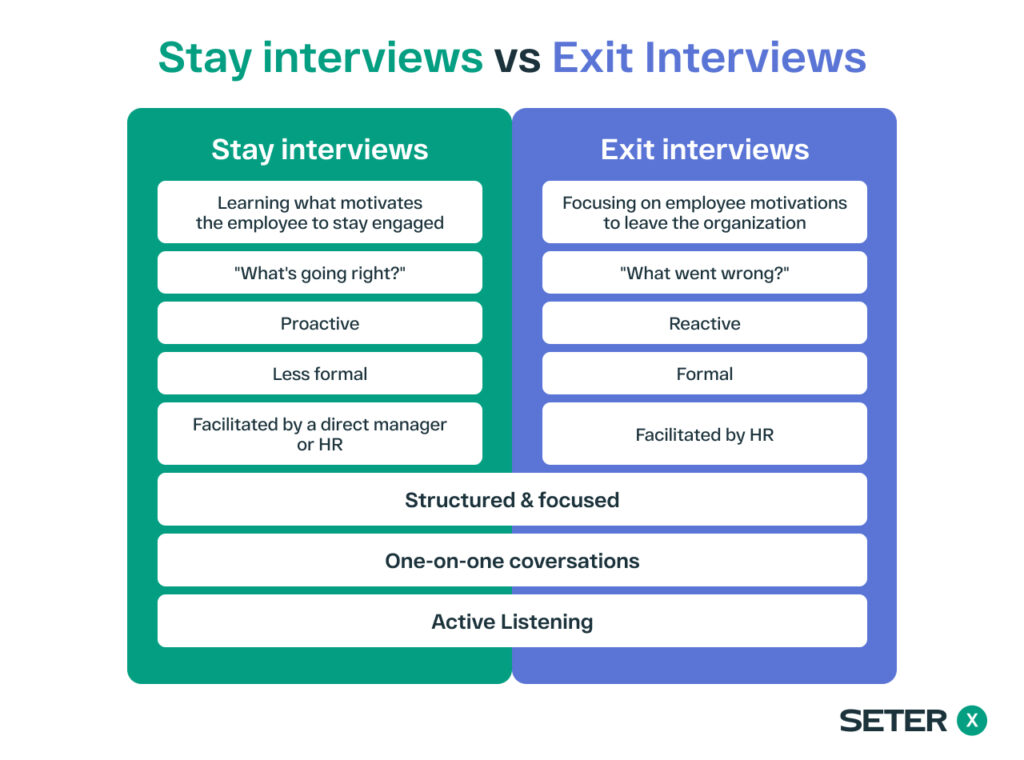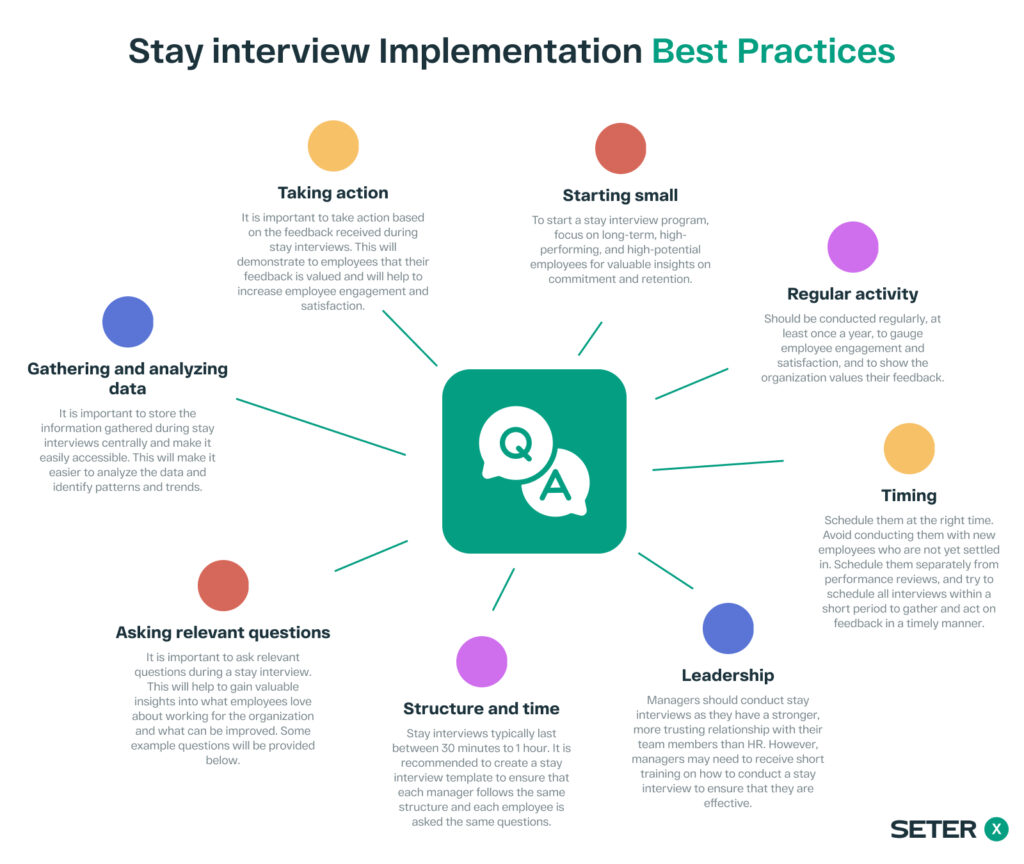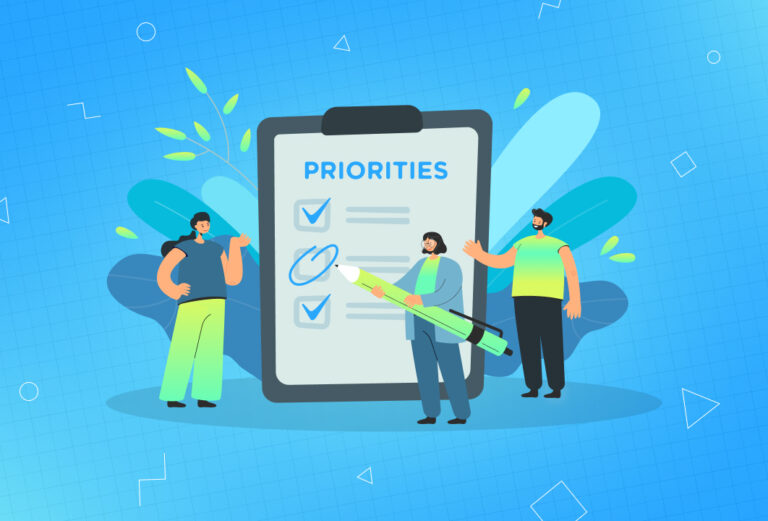
What is a stay interview?
A stay interview is a method used by organizations to understand why their high-performing employees choose to remain with the company. It involves a casual conversation between a manager and an employee, where the manager asks a set of predetermined questions to gather valuable employee feedback.
Stay interview vs exit interview
The primary objective of a stay interview is not to prevent employees from leaving but to improve employee satisfaction and engagement continually. Unlike exit interviews, which occur after an employee resigns, stay interviews are conducted with current employees.
Exit interviews, on the other side, are a part of the offboarding process and take place in the final stages of an employee’s tenure. Their aim is to shape the employee’s final impressions of the company and the image they portray to the outside world.

Why should you conduct stay interviews?
Conducting stay interviews is beneficial for multiple reasons. Firstly, it can help improve employee retention by providing insights into what employees love about the organization and what can be improved. For instance, by identifying issues such as lack of recognition, the company can implement employee and/or peer recognition programs to boost employee engagement and improve retention rates. With up to 40% of the workforce considering leaving their employer, such measures can make a significant difference.
Stay interviews also provide valuable feedback from employees, allowing companies to gather data on what employees want and need to stay in their current roles. This feedback helps companies avoid making assumptions and provides insights into areas that require improvement. By identifying pain points and areas for improvement, companies can boost employee satisfaction and engagement before issues become reasons for employees to seek alternative employment opportunities.
However, for stay interviews to be an effective engagement strategy, managers and employees must have a trusting relationship that encourages honest feedback. Additionally, companies must act on the feedback they receive during stay interviews; otherwise, employees may become disengaged instead of engaged.
How to conduct a stay interview?

Starting small: When initiating a stay interview program, it is not necessary to conduct stay interviews with every single employee. It is recommended to focus on your long-term, high performers, and high potentials to begin with. This will allow you to gain valuable insights from employees who are committed to the organization and are likely to stay for the long term.
Regular activity: Stay interviews should be conducted on a regular basis. This can mean different things to different companies, but it is recommended to conduct a stay interview at least once a year. This will help to keep a pulse on employee engagement and satisfaction, and will also demonstrate to employees that the organization values their feedback.
Timing of the interview: It is important to determine when to conduct the stay interview. Conducting the interview with an employee who has just started working for your organization may not be effective as they are not fully settled into their role and the company yet. Also, it is recommended to schedule the stay interview as a separate activity from the performance review process. Lastly, scheduling all stay interviews within a relatively short period of time will allow you to gather all the feedback and, if necessary, act upon it without leaving it unaddressed for too long.
The leadership of the interview: Managers should conduct stay interviews as they have a stronger, more trusting relationship with their team members than HR. However, managers may need to receive short training on how to conduct a stay interview to ensure that they are effective.
Structure and time: Stay interviews typically last between 30 minutes to 1 hour. It is recommended to create a stay interview template to ensure that each manager follows the same structure and each employee is asked the same questions.
Asking relevant questions: It is important to ask relevant questions during a stay interview. This will help to gain valuable insights into what employees love about working for the organization and what can be improved. Some example questions will be provided below.
Gathering and analyzing data: It is important to store the information gathered during stay interviews centrally and make it easily accessible. This will make it easier to analyze the data and identify patterns and trends.
Taking action: Finally, it is important to take action based on the feedback received during stay interviews. This will demonstrate to employees that their feedback is valued and will help to increase employee engagement and satisfaction.
Stay interview questions to ask about employee
What aspect of your work do you find most enjoyable and motivating?
This question can reveal the factors that keep employees engaged and driven in their work. Understanding what motivates employees can help you create an environment that fosters productivity, job satisfaction and professional development.
What part of your job causes you the most stress or frustration?
Asking that can help you identify areas where employees may need additional support or resources to perform their job effectively. Addressing these issues can lead to improved job satisfaction and productivity.
Have you ever considered leaving the company, and if so, why?
By asking this question, you can gain insight into the factors that may be causing employees to consider leaving. Addressing these concerns can help to retain top talent and improve employee retention.
Can you describe a situation where you felt undervalued or unappreciated at work?
Asking this question during a stay interview can help you identify areas where employees may not feel recognized or appreciated for their contributions. Addressing these issues can help to improve employee morale and job satisfaction.
Would you recommend our company to others looking for a job, and why or why not?
Responses to this question can provide valuable feedback on your company’s employer brand and reputation. Understanding what employees value about your company can help to attract top talent and improve recruitment efforts.
What would make you consider leaving the company for another opportunity?
Asking this question can provide insight into the factors that may lead employees to consider leaving, even if they are not actively looking for a new job. Understanding these factors can help you take steps to retain top talent and improve employee satisfaction.
Stay interview questions to ask about company culture
Do you feel that you receive adequate appreciation and recognition for your contributions to the company?
That stay interview question can provide insight into whether employees feel valued and recognized for their work. It’s essential to understand how employees perceive the recognition they receive to take steps to improve employee retention and engagement.
In what ways would you like to be acknowledged for your achievements in the company?
Asking this question can help to personalize employee recognition efforts and improve the effectiveness of recognition programs. Understanding what forms of recognition employees prefer can help to improve job satisfaction and employee engagement.
Is there anything you feel the company is not doing that it should be doing to improve the work experience for employees?
Asking this question can provide valuable feedback on areas where the company can improve to create a better working environment for employees. Identifying and addressing these issues can lead to improved employee satisfaction and company culture.
Stay interview questions to ask about job/position
What aspect of your job do you enjoy the most?
Gathering information about what employees like most about their jobs can help you improve their work experience and attract potential job candidates by highlighting the enjoyable parts of the job.
If you could, what aspect of your job would you eliminate?
By identifying the aspects of the job that employees find unpleasant or unimportant, you can work to reduce or remove these pain points.
In what ways are you not using your skills and abilities in your current role?
Discovering untapped employee potential can help you optimize their contributions to the company and encourage career development.
What changes would make your job more fulfilling?
Asking this question can reveal opportunities to improve employee satisfaction and engagement, especially if common responses suggest specific areas that need attention.
Do you feel you receive clear goals and objectives in your job?
Assessing whether employees receive clear direction and purpose in their work can help you identify opportunities to improve management practices and increase employee effectiveness.
As your manager, what could I do more or less of to support you?
Requesting feedback from employees about their managers can help identify areas for improvement in leadership and management practices.
How do you feel about the professional development opportunities available to you?
By understanding employees’ perceptions of current professional development opportunities, you can make informed decisions about improving these programs to help retain valuable employees.
Conclusion
In today’s fast-paced work environment, work-life balance is more critical than ever. The best way to ensure that employees are satisfied and motivated is to listen to their feedback regularly. One effective method for doing so is through stay interviews.
By gauging employee satisfaction and identifying areas for improvement, employers can take action to retain top talent. With a stay interview strategy in place, companies can identify what motivates employees, what their goals are, and what they want from their careers.
Ultimately, a positive work culture, combined with effective employee engagement, can lead to improved employee retention rates. By taking the time to understand the needs and desires of their employees, companies can create an environment that fosters loyalty, engagement, and productivity. Stay interviews are a powerful tool for achieving these goals and can be an essential component of any employer’s retention strategy.






